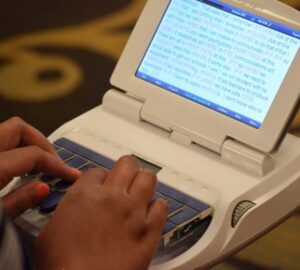By Sandra Mierop
Vacations are precious times. We reporters plan way in advance to take days off to give us enough time to make sure all of our work is finished before jetting off so that we don’t have the dark cloud of work looming over our heads while enjoying the relaxation. My husband and I planned on meeting my sister and brother-in-law in Amsterdam and then hopping on a train to have an “April in Paris” adventure for a few days. Everything was wonderful. The weather was gorgeous. We walked for miles and miles and visited all of the places that Americans somehow try to visit in three days like the Eiffel Tower, Notre Dame, Sacré, Coeur and Montmartre, the Louvre, and Musée D’Orsay.
But a different black cloud appeared over our vacation when my husband’s cell phone got pickpocketed on the Metro during rush hour as we were heading to the train to take us back to Amsterdam. Our first lesson: Heed the Metro’s P.A. system warnings that pickpockets are onboard and on the platforms — in three languages!
In the chaos of boarding the packed subway, my husband was not able to get onto the same train as the rest of our party. So he hopped on the next train, and when he went to text me that he had missed our train, he realized that his phone was gone. Before he boarded the train, he had been following the Metro schedule on his phone. He thinks that he just slipped the phone into his pocket when his train arrived, but he couldn’t recall locking it first which is his M.O. The iPhone’s shortest time for auto-lock is 30 seconds of inactivity which is a long time for a pickpocket to have access to and take control of the information on your phone. All that they have to do is keep the phone active by simply scanning through an app. Also, a passcode is not needed to change the auto-lock setting to “never” if the phone isn’t locked.
When he met us at the designated stop, he announced that his phone was stolen. I was amazed at how calm he was. He wears an iWatch, but when he used “find my phone,” nothing showed up because the pick pocket apparently immediately shut the phone off, which provided a little bit of comfort. I was able to contact our carrier right from the train platform, and the phone was suspended from the network within 15 minutes of it being stolen.
But we were still concerned about all of the “what-ifs” that loomed over having lost a phone: What if the criminals were able to download everything before the phone auto-locked if my husband didn’t lock it before he put it in his pocket? What if the criminals were able to change his auto-lock setting to “never”? What if the criminals were able to back everything off the phone before it was “killed” by our carrier? What if criminals had figured out another way to get all of the information off of the phone that we didn’t know about? What if the cloud didn’t work properly, and once he got a new phone, his data was missing?
And then there are the “what-ifs” about everything that went wrong. What if he just didn’t put the phone in his pocket? What if he really made sure that he locked the phone before he placed it in his pocket? What if he was more alert instead of worrying about missing the train? What if some of his apps were open with credit card information? What if he wasn’t with other people who had the ability to kill his phone as quickly as possible?
We learned some lessons that day and hope to pass those lessons along to you, although I hope you never lose a phone. Try these tips:
- Become obsessive about manually locking your phone. (On the iPhone, press the right button once.)
- Contact your service provider ASAP to “kill” the phone if it is stolen.
- Make sure to have lost or stolen phone insurance coverage. (We did, but my husband was still without a phone for more than a week.)
- Make sure that everything is backed up onto the cloud.
In the wake of this loss, we took all of the banking apps off of our phones and canceled some credit cards just for peace of mind. We beefed up our passcodes and added face recognition to open our phones. And we learned, when boarding a subway, choose a train in the middle of the platform, not close to the exits where pickpockets hang out for a clean getaway.
When my husband finally got his phone up and running again, the only things that weren’t backed up onto the cloud were his voice memos. So far – knock on wood – the only nefarious act that we know about is that the phone was stolen. But we did get a chuckle about a month after the pickpocket incident as we were in a restaurant having dinner with out-of-town visitors. A text appeared on my husband’s iWatch that his phone had been opened in China. By that time he knew that everything had already been wiped off the phone.
Sandra Mierop, FAPR, RPR, CRR, CRC, is a freelancer from Anchorage, Alaska. She can be reached at sandi@nlrr.com.











